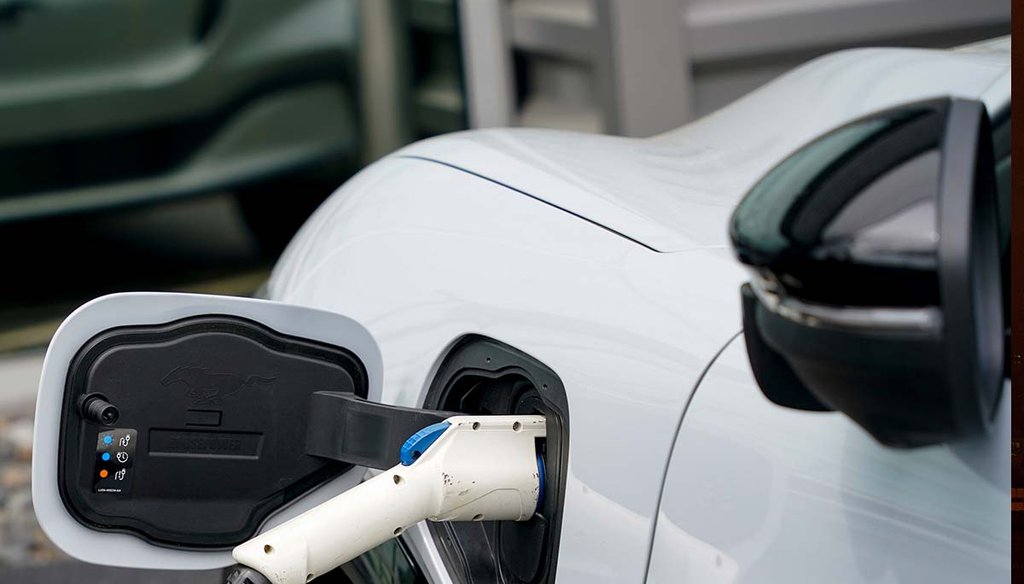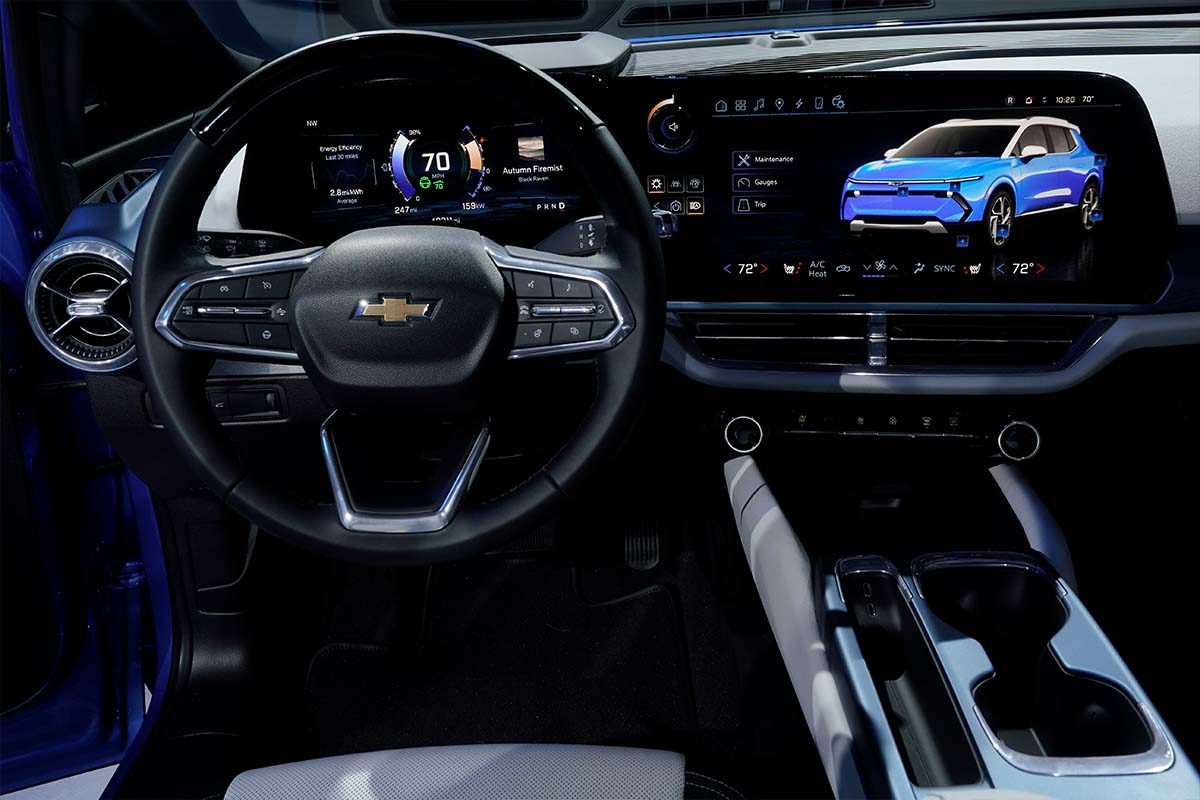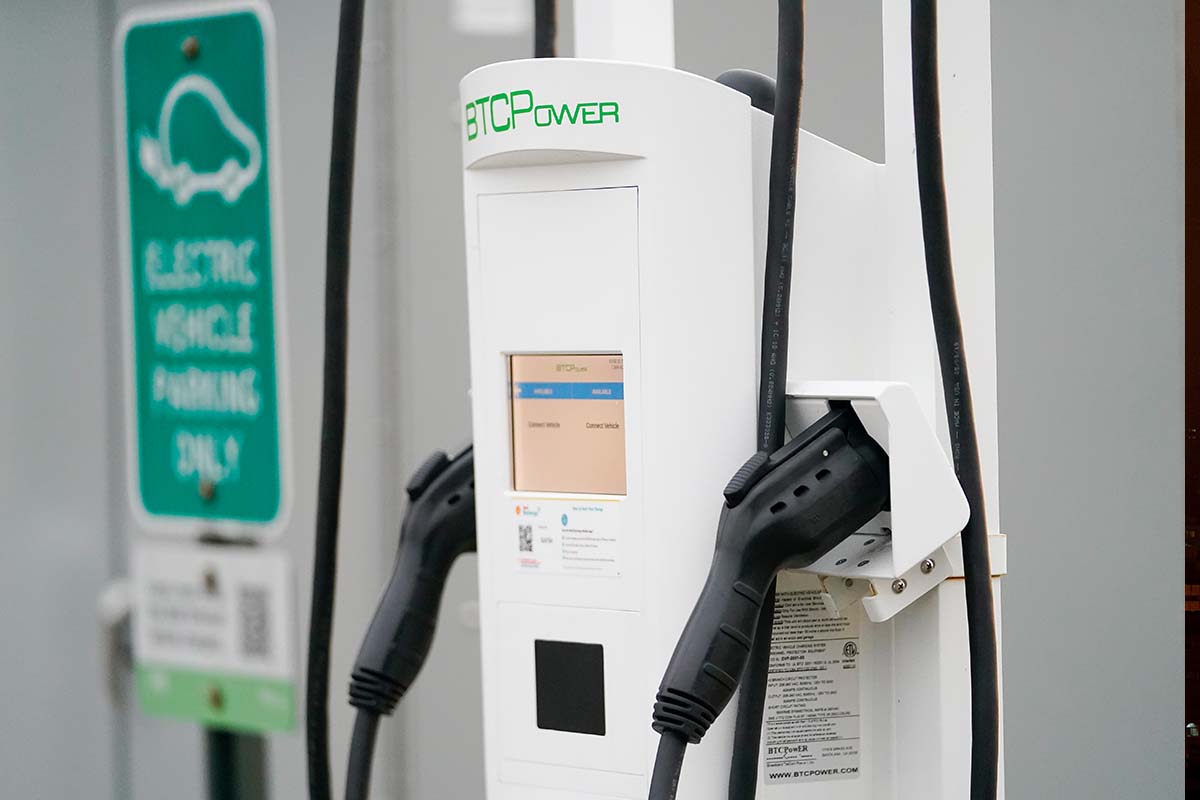Stand up for the facts!
Our only agenda is to publish the truth so you can be an informed participant in democracy.
We need your help.
I would like to contribute

A 2021 Ford Mustang Mach E charged at a Ford Motor Co. dealership in Wexford, Pa. (AP)
Is the end near for U.S. automakers? Former President Donald Trump recently told an audience of nonunion autoworkers near Detroit that electric cars are poised to doom their industry.
"Under Biden's mandate, the entire car industry will be packed up and shipped to China," Trump said during a Sept. 27 speech at an auto parts factory in Clinton Township, Michigan.
Two days later, speaking to a convention of California Republicans, Trump sounded a similar warning.
"California has imposed the most ridiculous car regulations anywhere in the world, with mandates to move to all electric cars," he said. "You (will) lose all your jobs, because they're all going to be made in China and other countries."
We contacted the Trump campaign for comment, but didn’t hear back.
Because Trump’s statement was a prediction, we can’t fact-check it. However, the underlying facts weaken Trump’s comment at the Michigan plant.
Although the traditional U.S. auto sector faces challenges from the industry’s shift to electric vehicles, including from China, there is no "Biden mandate" for electric vehicles to fully supplant gasoline-powered vehicles. Biden has offered significant aid to the U.S. auto sector to keep it competitive in the new EV marketplace.
American automakers were late to join the electric car push and now lag some overseas competitors, including China, said Chris Harto, a senior policy analyst for Consumer Reports who tracks the car industry.
U.S. companies such as Tesla and Rivian — two nonunion automakers that began as EV companies — have made strides in the expanding EV sector. (Tesla was the top EV seller in the U.S. in 2022.) But even they face supply chain challenges.
Data from the International Energy Agency, a Paris-based intergovernmental organization, shows China produces about three-quarters of all lithium-ion batteries. The U.S., by contrast, has just 7% of battery production capacity.
China also holds 70% and 85%, respectively, of production capacity for two key electric-vehicle battery parts: cathodes and anodes.
"(China) had the strategic vision to look ahead and see the future potential of EVs and made important investments while the rest of the automotive industry was asleep at the wheel," Harto said.
The Inflation Reduction Act, signed by Biden in August 2022, offers tax incentives for U.S. production of lithium-ion batteries and for the supply chain to produce them.
The U.S. also signed a memorandum of understanding in early 2023 to help build an electric vehicle battery supply chain in Congo and Zambia, countries with rich supplies of cobalt and other key minerals. This would keep these materials from being exported to China for processing, as happens now.
This should help, Harto said. "The build-out of the supply chains needed for future EV production volumes are just beginning, and … (the Biden) administration's policies are targeted at ensuring as much of that supply chain gets built domestically or within friendly nations."
However, establishing a supply chain that’s genuinely competitive with China’s could take years, Tu Le, the managing director of Sino Auto Insights, a business consulting company that specializes in transportation, told German news outlet Deutsche Welle.
Despite the U.S. sector’s challenges, Trump is wrong to say there is a "Biden mandate" to replace gasoline-powered cars with EVs.
The Biden administration has set a goal — not a mandate — to have electric vehicles comprise half of all new vehicle sales by 2030.
Separately, California has instituted an escalating scale for the percentage of new zero-emission cars and light trucks that must be sold on car lots — 35% by 2026, 68% by 2030 and 100% by 2035. But this wasn’t something Biden did, and California’s action does not ban existing gasoline-powered cars.
Also, the Environmental Protection Agency proposed new emissions standards to cut 10 billion tons of carbon dioxide, a greenhouse gas that scientists say drives climate change. The EPA projects that because of the standards, EVs could account for 67% of new light-duty vehicle sales and 46% of new medium-duty vehicle sales by 2032.
Sam Fiorani, an analyst with consulting company AutoForecast Solutions, said the EPA’s policies focus on emissions and are agnostic about technologies. So, although these policies would likely boost electrified vehicles, they wouldn’t ban gasoline-fueled powertrains.
The Inflation Reduction Act, a Biden policy agenda cornerstone, included tax credits up to $7,500 to encourage people to buy EVs. Another key Biden agenda item, the bipartisan infrastructure law, includes $7.5 billion in EV charging investments; $7 billion for EV battery components, critical minerals and materials; and $10 billion for other "clean transportation" initiatives.
In August, the Energy Department announced a $15.5 billion loan and funding package to help existing car manufacturing plants retool for electric vehicles. And in June, the Energy Department said it would lend $9.2 billion to Ford Motor Co. and a supply partner to build three electric vehicle battery factories in Kentucky and Tennessee.
"If the (Biden) administration does not incentivize an electric transition, it means the U.S. will cede EV leadership to China," said Tod Rutherford, a professor in Syracuse University’s Geography and the Environment Department and a car industry specialist. "The Europeans are very alarmed by this and especially the German manufacturers are scrambling to catch up. In other words, there is not only an environmental issue here but an economic one."
Amid these incentives and assistance packages, U.S. automakers have reiterated their desire to move toward EVs.
A 2021 Reuters analysis showed carmakers planned to spend an estimated $515 billion over five to 10 years to develop and build new battery-powered vehicles. That’s up from $300 billion three years earlier. Reuters found that U.S. automakers General Motors Co. and Ford Motor Co. expected to spend nearly $60 billion on EVs through 2025.
Stellantis, Chrysler’s parent company, said it will invest $35.5 billion on EVs and their technologies through 2025, NBC News reported. And an analysis of press releases, company earnings reports and public resources by electric-car market tracker Atlas Public Policy showed an estimated $210 billion is expected to be invested in U.S. electric-car making by 2030.
The White House estimates that carmakers have invested $85 billion in manufacturing electric vehicles, batteries and chargers in the United States during Biden’s administration.
In all, Trump’s assertion that the car industry will be leaving the United States is "substanceless," said Jeremy J. Michalek, a Carnegie Mellon University engineering and public policy professor who directs the school’s Vehicle Electrification Group.
Powertrain system production will shift from gasoline engines toward electric motors and batteries, he said. But most other materials and components needed to make a car won’t and may be supplied by a variety of nations.
"There are likely to be complex effects of this shift, but all automobiles are already produced with a mix of systems and components produced across a global supply chain, so this really isn't new," he said.
Our Sources
C-SPAN, Donald Trump rally, Clinton Township, Michigan, Sept. 27, 2023
C-SPAN, Donald Trump, speech, California Republican Convention, Sept. 29, 2023
The White House, President Biden’s economic Plan drives America’s electi4rc vehicle manufacturing boom, Sept. 14, 2022
Insider, Elon Musk says 2021 has been a year of 'super crazy supply-chain shortages' for Tesla, Sept. 1, 2021
Elektrek, 2022’s top 10 best-selling electric vehicles in the US: Find out why they made the cut, Jan. 9, 2023
Atlas EV Hub, $210 Billion of Announced Investments in Electric Vehicle Manufacturing Headed for the U.S., Jan 12, 2023
C-SPAN, Donald Trump rally in Clinton Township, Michigan, Sept. 27, 2023
The Hill, Trump vows to end ‘madness’ of EV push, Sept. 5, 2023
Car & Driver, Trump, trade, and U.S.-China automotive tariffs: the timeline, Dec. 11, 2018
NBC, "Meet the Press" transcript, Sept. 17, 2023
Donald Trump, Truth Social post, Sept. 23, 2023
The New York Times, Battle over electric vehicles is central to auto strike, Sept. 16, 2023
CNN, Trump is attacking electric vehicles. Automakers already bet their future on them, Setp. 29, 2023
Reuters, Global carmakers now target $515 billion for EVs, batteries, Nov. 10, 2021
International Energy Agency, Global EV Outlook 2023, accessed Sept. 26, 2023
The White House, Biden-Harris administration announces new standards and major progress for a made-in-America national network of electric vehicle chargers, Feb, 15, 2023
Forbes, EV Fact Check: Tesla is keeping American car industry alive, ‘relevant,’ Sept. 17, 2023
Bridge Michigan, Trump said EVs will ‘decimate’ Michigan. Bridge fact-checks his claims, June 26, 2023
The State, Fact check: Trump makes false claims in SC about EVs as industry to invest billions in state, Jan. 30, 2023
Los Angeles Times, Trump joins the fray over Tesla plant reopening amid coronavirus restrictions, May 12, 2020
The White House: Fact sheet: Biden-Harris administration announces new private and public sector investments for affordable electric vehicles, April 17, 2023
The Hill, Trump hammers Biden on electric cars with an eye on Michigan, Sept. 13, 2023
Edmunds, Electric vehicle tax credits 2023: what you need to know, July 12, 2023
Environmental Protection Agency, Biden-Harris administration proposes strongest-ever pollution standards for cars and trucks to accelerate Transition to a clean-transportation future April 12, 2023
CNET, These 9 states are banning the sale of gas-powered cars, Sept. 7, 2023
The White House, EV acceleration challenge, accessed Oct. 3, 2023
Email interview, Tod Rutherford, professor, Syracuse University Georgraphy and the Envrient department, Oct. 3, 2023
Email interview, Chris Harto, Chris Harto, senior policy analyst, Consumer Reports, Oct. 4. 2023
Email interview Sam Fiorani, vice president, Global Vehicle Forecasting, AutoForecast Solutions, Oct. 4, 2023
Email interview, Jeremy J. Michalek, director, vehicle electrification group, Carnegie Mellon University, Oct. 4, 2023













































